De Nederlandse dichter Erik Menkveld werd geboren op 25 april 1959 in Eindhoven. Zie ook alle tags voor Erik Menkveld op dit blog.
Prime time I
Openbaar aanklager heropent na jaren de zaak
tegen vermeende moordenaars met nieuw materiaal:
het aanhoudend warme weer, de mogelijke klimatologische
veranderingen, duizelingwekkende luchtopnames
van Vietnam, de oprechte twijfels achteraf en spijtbetuiging
van een bommenwerperpiloot, seismografische metingen,
olie- en gasboringen, militaire oefeningen met sonars
en scheepvaartverkeer, het lawaai onder water…
Zwarte tranen
Wat heb ik er weinig van meegemaakt,
de myriaden voorvallen op aarde
die eindigden binnen de 31 miljoen
622 duizend en 401 seconden
uitgeroepen tot het jaar 2008.
Al het schenden, met voeten treden,
graaien, overstromen, al het fanatieke
moorden en oplaaien – godzijgeloofd
kon ik ze hier gedrukt voorbij zien komen
en overgaan tot de orde van mijn dag.
Is het ooit anders geweest? De een heeft
nooit geweten wat hem raakte, de ander
is het weer vergeten. Zelfs de zwarte
tranen van de hoop vervagen al.
Wolkjes inkt in een oceaan.
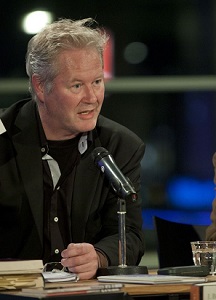
Erik Menkveld (25 april 1959 – 30 maart 2014)
De Amerikaanse dichter Ted Kooser werd geboren op 25 april 1939 in Ames, Iowa. Zie ook alle tags voor Ted Kooser op dit blog.
Depression Glass
It seemed those rose-pink dishes
she kept for special company
were always cold, brought down
from the shelf in jingling stacks,
the plates like the panes of ice
she broke from the water bucket
winter mornings, the flaring cups
like tulips that opened too early
and got bitten by frost. They chilled
the coffee no matter how quickly
you drank, while a heavy
everyday mug would have kept
a splash hot for the better
part of a conversation. It was hard
to hold up your end of the gossip
with your coffee cold, but it was
a special occasion, just the same,
to sit at her kitchen table
and sip the bitter percolation
of the past week’s rumors from cups
it had taken a year to collect
at the grocery, with one piece free
for each five pounds of flour.
An Epiphany
I have seen the Brown Recluse Spider
run with a net in her hand, or rather,
what resembled a net, what resembled
a hand. She ran down the gleaming white floor
of the bathtub, trailing a frail swirl
of hair, and in it the hull of a beetle
lay woven. The hair was my wife’s,
long and dark, a few loose strands, a curl
she might idly have turned on a finger,
she might idly have twisted, speaking to me,
and the legs of the beetle were broken.

Ted Kooser (Ames, 25 april 1939)
De Engelse dichter, schrijver, criticus en letterkundige James Fenton werd geboren op 25 april 1949 in Lincoln. Zie ook alle tags voor James Fenton op dit blog.
Uit: The need to complete (Over T.S. Eliot)
“Anyone who has any great interest in poetry will agree that we need a complete edition of the works of TS Eliot. Me, I can’t wait. The admirable Auden edition, to which a new volume of the collected prose is just about to be added, keeps moving forward. Not every reader will need every volume of it, but every lover of Auden’s work will be happy to know that it is there, and admirably executed, and if onewill be available.
With Eliot, the need is far greater: there is much, much more in the way of uncollected and unavailable prose: 700 uncollected items, all kinds of ephemeral pieces, many of them missing from the standard bibliography, which is itself due for complete revision. The new bibliography is under way, in the hands of Archie Henderson.
The Complete Poems – two volumes of it – is also in hand. Christopher Ricks is the editor and publication is perhaps three years away. In this case, it is not that we expect another “Waste Land” to turn up. It is a matter of wanting to see the work whole – great poems, dreadful poems, trivia, whatever there is. When it comes to a poet like this, I’m a staunch completist.
Then there is the stalled edition of the Collected Letters, which began so well with a first volume in 1988, edited by Valerie Eliot. That first volume is now due for revision and, together with a second volume, is due out in 2009, with Hugh Haughton at the helm. Thereafter things are expected to proceed at a modest pace.” did need to look something up (some fugitive essay, some unfinished or abandoned poem) in the fullness of time everything will be available.”
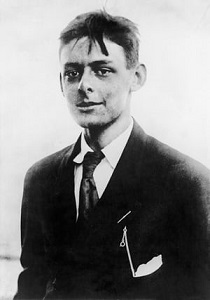
James Fenton (Lincoln, 25 april 1949)
T. S. Eliot
De Engelse dichter Walter John de la Mare werd geboren op 25 april 1873 in Charlton, Kent. Zie ook alle tags voor Walter John de la Mare op dit blog.
Song of the Mad Prince
Who said, “Peacock Pie”?
The old King to the sparrow:
Who said, “Crops are ripe”?
Rust to the harrow:
Who said, “Where sleeps she now?
Where rests she now her head,
Bathed in eve’s loveliness”? —
That’s what I said.
Who said, “Ay, mum’s the word”?
Sexton to willow:
Who said, “Green dusk for dreams,
Moss for a pillow”?
Who said, “All Time’s delight
Hath she for narrow bed;
Life’s troubled bubble broken”? —
That’s what I said.
Dry August Burned
Dry August burned. A harvest hare
Limp on the kitchen table lay,
Its fur blood-blubbered, eye astare,
While a small child that stood near by
Wept out her heart to see it there.
Sharp came the clop of hoofs, the clang
Of dangling chain, voices that rang
Out like a leveret she ran,
To feast her glistening bird-clear eyes
On a team of field artillery
Gay, to manaeuvres, thudding by.
Spur and gun and limber plate
Flashed in the sun. Alert, elate,
Noble horses, foam at lip,
Harness, stirrup, holster, whip,
She watched the sun-tanned soldiery,
Till dust-white hedge had hidden away —
Its din into a rumour thinned —
The laughing, jolting, wild array:
And then — the wonder and tumult gone —
Stood nibbling a green leaf, alone,
Her dark eyes, dreaming. . . . She turned, and ran,
Elf-like, into the house again.
The hare had vanished. . . . ‘ Mother, ‘ she said,
Her tear-stained cheek now flushed with red,
‘ Please, may I go and see it skinned? ‘
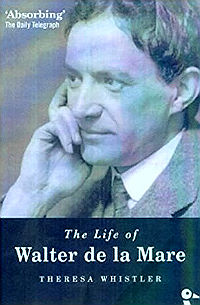
Walter John de la Mare (25 april 1873 – 22 juni 1956)
Cover biografie
De Duitse dichter en schrijver Richard Anders werd geboren op 25 april 1928 in Ortelsburg, tegenwoordig Szczytno, Polen. Zie ook alle tags voor Richard Anders op dit blog.
Der Unsterbliche
vom Schnee-
vom Sterngestöber
das Marmorhaar
Unter der Stirn
statt der Augen
bis auf die Knochen
durchsichtige Topase
So fest geschlossen
daß zwischen den Lippen
Messer zerspringen
der Marmormund
Den Marmorhut
in der Marmorhand
den Marmorfuß
im Marmorschuh
zögert er eine Ewigkeit
ehe er sich schweren Schritts
von seinem Schatten trennt
und über den Sockelrand stürzt
Sinn
Von toten Buchstaben auferstanden, machst du erst Sinn, machst du
erst Sinn, wenn du nicht wie Erz tönst sondern aus voller Kehle ins
Blaue springst. Aber hoffe nicht, daß Engel dich fangen. Ob du steigst
oder stürzt, hängt allein davon ab, ob deine toten Buchstaben zu
Lebzeiten Oben oder Unten die tiefere, die höhere Bedeutung beilegten.
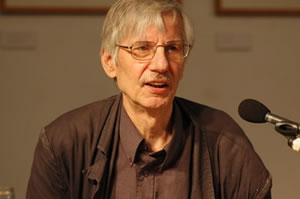
Richard Anders (25 april 1928 – 24 juni 2014)
De Engelse essayist en diplomaat Sir William Temple werd geboren in Londen op 25 april 1628. Zie ook alle tags voor Willam Temple op dit blog.
Uit: Observations upon the United Provinces of the Netherland
‘Tis likely, the Changes, arrived since that Age in these Countries, may have been made by stoppages grown in time, with the rolling of Sands upon the mouths of three great Rivers, which disimbogued into the Sea through the Coasts of these Provinces; That is, the Rhine, the Mose, and the Scheld. The ancient Rhine divided, where Skencksconce now stands, into two Rivers; of which, one kept the name, till, running near Leyden, it fell into the Sea at Catwick; where are still seen, at low Tides, the Foundations of an ancient Roman Castle that commanded the mouth of this River: But this is wholly stopt up, though a great Canal still preserves the Name of the Old Rhine. The Mose, running by Dort and Rotterdam, fell, as it now does, into the Sea at the Briel, with mighty issues of Water; But the Sands, gather’d for three or four Leagues upon this Coast, make the Haven extreme dangerous, without great skill of Pilots, and use of Pilot-boats, that come out with every Tide, to welcome and secure the Ships bound for that River; And it is probable, that these Sands, having obstructed the free course of the River has at times caused or encreased those Inundations, out of which so many Islands have been recovered, and of which, that part of the Country is so much composed.
The Scheld seems to have had its issue by Walcheren in Zealand, which was an Island in the mouth of that River, till the Inundations of that, and the Mose, seem to have been joyned together, by some great Helps, or Irruptions of the Sea, by which, the whole Country was overwhelmed, which now makes that Inland-Sea, that serves for a common passage between Holland, Zealand, Flanders, and Brabant; The Sea, for some Leagues from Zealand, lyes generally upon such Banks of Sand, as it does upon the mouth of the Maze, though separated by something better Channels than are found in the other.
That which seems likeliest to have been the occasion of stopping up wholly one of these Rivers, and obstructing the others, Is the course of Westerly Winds, (which drive upon this Shore) being so much more constant and violent than the East: For, taking the Seasons, and Years, one with another, I suppose, there will be observed three parts of Westerly for one of Easterly Winds; Besides, that these generally attend the calm Frosts and fair weather; and the other, the stormy and foul.”
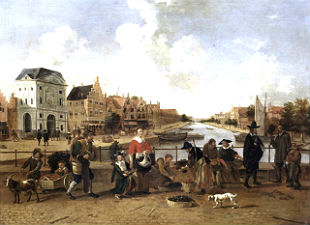
William Temple (25 april 1628 – 27 januari 1699)
Leiden, Groenmarkt met gezicht op de Stille Rijn door Hendrik van der Burgh, ca. 1627
De Engelse dichter en predikant John Keble werd geboren op geboren 25 april 1792 in Fairford, Gloucestershire. Zie ook alle tags voor John Keble op dit blog.
Sun Of My Soul
Sun of my soul, Thou Savior dear,
It is not night if Thou be near;
O may no earthborn cloud arise
To hide Thee from Thy servant’s eyes.
When the soft dews of kindly sleep
My wearied eyelids gently steep,
Be my last thought, how sweet to rest
Forever on my Savior’s breast.
Abide with me from morn till eve,
For without Thee I cannot live;
Abide with me when night is nigh,
For without Thee I dare not die.
If some poor wandering child of Thine
Has spurned today the voice Divine,
Now, Lord, the gracious work begin;
Let him no more lie down in sin.
Watch by the sick, enrich the poor
With blessings from Thy boundless store;
Be every mourner’s sleep tonight,
Like infants’ slumbers, pure and right.
Come near and bless us when we wake,
Ere through the world our way we take,
Till in the ocean of Thy love
We lose ourselves in heaven above.
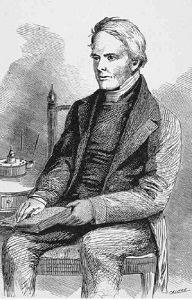
John Keble (25 april 1792 – 29 maart 1866)
Rond 1832
De Amerikaanse schrijver Ross Franklin Lockridge Jr. werd geboren op 25 april 1914 in Bloomington, Indiana. Zie ook alle tags voor Ross Franklin Lockridge Jr. op dit blog.
Uit: Raintree County
“Now he shut the door, drowning the noise of the crowd to a confused murmur.
–I was expecting you, Johnny, the woman said in the same husky voice. Where have you been?
–I was just on my way to greet the Senator, he said. Is there–is there some mail for me?
He walked slowly toward the distribution window, where in the darkness a face was looking out at him.
–Some letters carved on stone, the voice said. The fragments of forgotten language. I take my pen in hand ant seat myself–
The woman was lying on a stone slab that extended dimly into the space where the window usually was. She lay on her stomach, chin propped on hands. Her hair was a dark gold, unloosened. Her eyes were a great cat’s, feminine, fountain-green, enigmatic. A dim smile curved her lips.
She was naked, her body palely flowing back from him in an attitude of languor.
He was disturbed by this unexpected, this triumphant nakedness. He was aroused to memory and desire by the stately back and generously sculptured flanks.
–How do you like my costume, Johnny? she asked, her voice tinged with mockery.
–Very becoming, he said.
Her husky laughter filled the room, echoing down the vague recess into which she lay. He hadn’t noticed before that the slab was a stone couch, curling into huge paws under her head. He was trying to understand what her reappearance meant on this memorial day.
Watching him with wistful eyes, she had begun to bind up her hair, fastening it behind her ears with silver coins.“
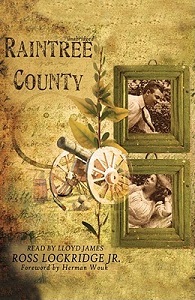
Ross Franklin Lockridge Jr. (25 april 1914 – 6 maart 1948)
Cover
De Spaanse schrijver Leopoldo Alas (wereldwijd bekend als ‘Clarín’) werd geboren op 25 april 1852 in Zamora. Zie ook alle tags voor Leopoldo Alas op dit blog.
Uit: Die Präsidentin (Vertaald door Egon Hartmann)
„Die heldenhafte Stadt hielt Mittagsruhe. Der warme, träge Südwind blies die weißlichen Wolken vor sich her, die auf ihrer Fahrt nach Norden zerf latterten. In den Straßen war es totenstill, bis auf das Rascheln der Wirbel aus Staub, Lumpen, Strohhalmen und Papierfetzen, die von Rinnstein zu Rinnstein, von Gehsteig zu Gehsteig, von Ecke zu Ecke tanzten, kreisten und hintereinander hertaumelten wie Schmetterlinge, die sich suchen, voreinander fliehen und die die Luft auf unsichtbaren Schwingen trägt. Gleich Rudeln kleiner Gassenjungen sammelten sich diese Abfälle von allen möglichen Kehrichthaufen, verhielten einen Augenblick wie vom Schlaf übermannt, fuhren aufgeschreckt wieder hoch, stoben auseinander, wobei manche an den Mauern bis zu den schwankenden Glaszylindern der Straßenlaternen, andere zu den liederlich an die Ecken geklebten Plakaten emporkletterten. Eine Feder gelangte bis hinauf zum dritten Stock, und ein Sandkorn setzte sich, an die Bleifassung geklammert, für Tage oder Jahre an der Scheibe eines Schaufensters fest.
Vetusta, die altehrwürdige, königstreue Stadt, in fernen Jahrhunderten Sitz des Hofes, verdaute ihren Cocido, ihre Olla podrida, ruhte und vernahm dabei im Halbschlaf das eintçnige, vertraute Schlagen der Chorglocke, die hoch oben auf dem schlanken Turm der heiligen Basilika dröhnte.
Der Turm, ein romantisches Poem aus Stein, eine liebliche Hymne zarter Linien von stummer, unvergänglicher Schönheit, war, wiewohl früher begonnen, ein Werk des 16. Jahrhunderts im gotischen Stil, jedoch durch Sinn für Maß und Harmonie gemildert, der die vulgären Überspitzungen dieser Architektur abgewandelt hatte. Ohne daß der Blick erm_dete, konnte man stundenlang diesen steinernen Zeigefinger betrachten, der gen Himmel wies. Es war keiner jener Türme, deren Spitzen, eher schwächlich als schlank und geziert wie überelegante junge Damen, die sich zu eng schnüren, vor Zartheit wegzuknicken scheinen. Er war wuchtig, ohne dadurch etwas von seiner Erhabenheit einzubüßen.“
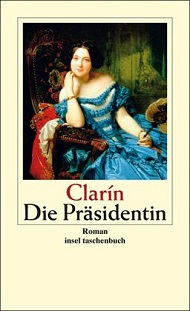
Leopoldo Alas (25 april 1852 – 13 juni 1901)
Cover
Zie voor nog meer schrijvers van de 25e april ook mijn blog van 25 april 2016 en mijn blog van 25 april 2015 deel 2.
